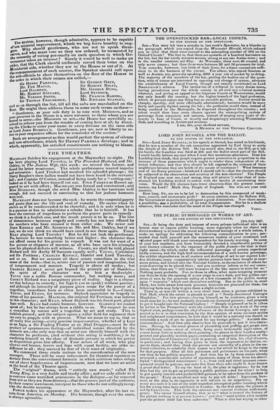THE THEATRES.
MACREADY finishes his engagement at the Haymarket to-night. He Ina been playing Lord Townley, in The Provoked Husband, and Mr. Oakley, in The Jealous Wire, this week : we missed the former, and found the latter wearisome. The whole performance wanted impulse and animation : Lord Trinket had moulted his splendid plumage ; Sit Barry Beagles's view-halloo would not have been heard in the servants' ball; and Captain O'Cutter, instead of being ready for a "cutting-out," looked as if he had been himself cut out. Even 'PARKER as Russet ap- peared to act with effort ; MACREADy was formal and constrained ; and Miss HUDDART, though she acted Mrs. Oakley in her tantrums well enough, did not succeed in convincing us that her jealous humours were real.
31AcREADY does not become the sock : he wants the congenial gayety and gusto that are the life and soul of comedy. He seems when he smiles as if he condescended to be cheerful; and it is only when he is in a passion or has to administer a rebuke that he is himself. It has been the custom of tragedians to perform the graver parts in comedy : we think it a foolish one, and the result proves it to be so. The line of demarcation between tragedy and comedy has not been effaced by the numbers who have crossed it from either side. We never saw JOHN KEMBLE and Mr. SIDDONS as Mr. and Mrs. Oakley, but if we had, we do not think we should have cared to see them again. Fancy KEAN playing Lord Townley ! But he did not look the gentleman. No, because he was something better and higher : the character does not afford room for his genius to expand. It was not for want of a fine person or elegance of manner, as all who have seen his triumphs over his physical defects will witness. COOKE, we shall be told, played Richard and Sir Archy M'Sarcasm equally well ; YOUNG, Coriolanus and Sir Pertinax ; CHARLES KEMBLE, Hamlet and Lord Townley ; and so on. But we account all these actors comedians in the true sense of the term—that is, actors not of passion and imagination, but of temperament and manner. Tragedy is above all modes ; but CHARLES KEMBLE never got beyond the princely air of Hamlet— the spirit of the character was to him a deadweight : YOUNG was a noble Roman commander, but nothing more ; and CooKE's Richard was a sanguinary piece of reality, logo is a charac- ter that belongs to comedy ; for logo is (so to speak) without passion ; and although its intensity of purpose gives scope for the power of a tragedian, comedians have as often been successful in it,—COOKE, YOUNG, and ELToN, for instance. Shylock appertains to tragedy in yinue of his passion : MACKLIN, the original Sir Pertinax, was famous in this character ; and KEAN, whose Shylock was his finest part, played lago well. KEAN had comic humour, however. GARRICK we cannot speak of; but he has always been a riddle to us. We suspect he was a comedian by nature and a tragedian by art and study. This is ticklish ground; and the subject opens a wider field for argument than we care to grapple with at present. What we mean to say is, that as all really fine acting—every genuine impersonation, whether of a Lear Oran Iago, a Sir Fopling Flutter or an Abel Drugger—must be the product of spontaneous feeling—of individual nature directed by the mimetic art—the only way that an actor can identify himself with the character he performs, (and without this acting is worthless,) is by confining himself to the class of dramatic persons to which his genius or disposition gives him affinity. Your actors of all work, who play Clowns and heroes, lovers and fops with equal facility, are alike in- different in all : they succeed by dint of their want of originality.
We commend these crude notions to the consideration of the new manager. There will be some inducement for theatrical reporters to deviate from the conventional formuhe in which criticism takes refuge out of sheer hopelessness of improvement, now that we have an artist at the head of the Theatre again.
The "original" drama, with "entirely new music," called The Young King, is a very feeble and trashy affair ; and we only allude to it to censure some wretched pruriencies in the dialogue—as far removed from wit as they are from decency—that the grosser part of the audience, by their coarse merriment, interpret to those who do not willingly recog- nige the double meaning.
POWER • a ma es his appearance at the Haymarket, after his last re- turn from America, on Monday. His humour, though ever the same, is always agreeable.


























 Previous page
Previous page